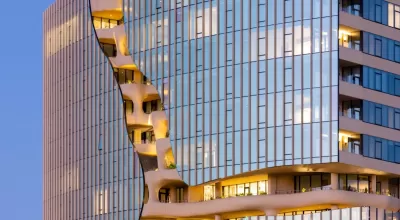Unlike other new builds in Denver, Colorado, a new high-rise reveals a unique “sculptural canyon” running vertically through the facade to foster a sense of community and connection to nature.

Denver, Colorado, unveiled its newly built sixteen-story residential tower, “One River North," which showcases an impressive “cracked-open canyon facade."
The building is located in the River North Art District (RiNo) and includes 187 rental units across 15 floors. The “cracked-open canyon” is a four-story amenity space that stretches virtually from the sixth to the ninth floor. Featuring vibrant greenery, rock installations, falling water cascades, and mountainous staircases, this communal area offers "more than 13,000 square feet of landscaped terraces, water features, and some of the most dramatic views of Denver and the surrounding mountains."
According to Ma Yansong, the head architect of building designers MAD Architects, “One River North” was created to bring Colorado's rugged mountain ranges to the heart of the city, presenting a revitalizing blend of "urban development and natural landscape.”
In an interview with Designboom, Ma Yansong explains the inspiration behind the design: “Imagine living in a building yet feeling as though you’re immersed in a natural landscape — like living within a canyon itself ... the canyon is about creating a surreal experience that sparks people’s imagination of the surrounding nature. This entire design is meant to evoke artistic surrealism. While it’s artificial, it allows people to feel an emotional connection to nature.”
When questioned about incorporating urban planning principles into the residential build, Ma Yansong notes the importance of sustainable development and biophilic design, an architectural approach that enriches occupant connectivity to the natural environment: "I believe that people in modern cities, often living in towers, need more than just enclosed spaces; they need access to natural environments, outdoor areas, and public spaces that foster a sense of community. If you look at modern cities, they’re full of buildings focused on efficiency and maximizing space, often taking more space from nature … as cities grow taller and more vertical, we need to provide more public, green, and outdoor spaces in the sky. This is sustainable because it’s green, but more importantly, it creates sociological and emotional spaces for people living in high-density cities.”
Though this dynamic high-rise includes creative design and architectural innovation, what can be said about the accessibility and affordability of the residence? By uniquely fulfilling the demand for high-density housing in Denver, the residence strives to be a place of social, economic, and cultural inclusivity. Ma Yansong echoes this notion in his remarks, “the design is centred around the canyon space and its connection to nature. In this way, everyone is the same, we are committed to fostering inclusion and equity — it’s not based on social class, it’s welcoming to all. I believe nature is something that can bring equality to everyone. That’s the power of art — art that allows everyone to feel equal and rewarded.”
FULL STORY: One River North: A Vertical Canyon in Denver, Colorado

Planetizen Federal Action Tracker
A weekly monitor of how Trump’s orders and actions are impacting planners and planning in America.

San Francisco's School District Spent $105M To Build Affordable Housing for Teachers — And That's Just the Beginning
SFUSD joins a growing list of school districts using their land holdings to address housing affordability challenges faced by their own employees.

The Tiny, Adorable $7,000 Car Turning Japan Onto EVs
The single seat Mibot charges from a regular plug as quickly as an iPad, and is about half the price of an average EV.

Seattle's Plan for Adopting Driverless Cars
Equity, safety, accessibility and affordability are front of mind as the city prepares for robotaxis and other autonomous vehicles.

As Trump Phases Out FEMA, Is It Time to Flee the Floodplains?
With less federal funding available for disaster relief efforts, the need to relocate at-risk communities is more urgent than ever.

With Protected Lanes, 460% More People Commute by Bike
For those needing more ammo, more data proving what we already knew is here.
Urban Design for Planners 1: Software Tools
This six-course series explores essential urban design concepts using open source software and equips planners with the tools they need to participate fully in the urban design process.
Planning for Universal Design
Learn the tools for implementing Universal Design in planning regulations.
Smith Gee Studio
City of Charlotte
City of Camden Redevelopment Agency
City of Astoria
Transportation Research & Education Center (TREC) at Portland State University
US High Speed Rail Association
City of Camden Redevelopment Agency
Municipality of Princeton (NJ)


























